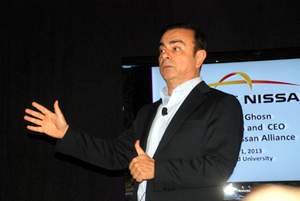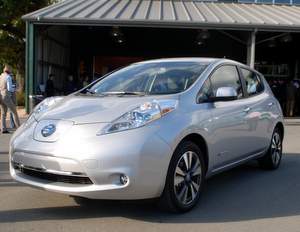
Carlos Ghosn has a lot on his plate. He’s CEO of Nissan and Renault, two large car companies on their own and one of the top tier automakers when combined as the Nissan-Renault Alliance. That 13-year-old Alliance is proving, unlike other similar attempts, to be durable and appears to give the two partners the best of both worlds –shared car technology and back end expenses while still maintaining strong individual identities.
When speaking recently at a “Open Garage” talk at Stanford’s Automotive Innovation Center, Ghosn pointed with pride that his Alliance has put 70,000 EVs on the road around the world (of the roughly 100,000 pure battery electrics currently out there). He said that in spite of failing to hit his own targets for volume, he believes electric vehicle technology will be the winner as it approaches scale production – and he believes that is inevitable. The secret ingredient, he said, was emotion. “Car emotion is the key to the future,” he emphasized. At present he is “not happy” with sales as the cars have hit “a lot of headwinds,” but he optimistically noted that Nissan can ramp up quickly if demand rises.
But putting emotion into a car many still see as an expensive, not-too-practical mobility appliance will have more challenges because the automobile does not exist in a vacuum. The changes that our society faces will mean the cars of the near future will have to address several issues while trying to establish an emotional connection with car buyers.
Safety
The first is safety. As Ghosn explained it, industry expects to see 100 million new cars on the road annually by 2020 as the world economy grows. “Is the present system sustainable,” he asked rhetorically. “We know it’s not.”
He noted there are currently six million car crashes a year in the U.S. alone and auto accidents are the leading cause of death for individuals from age 4 to 34. Ghosn added that 96% of those crashes were due to human error. “We have the technology to avoid most crashes,” he asserted. The trick for automakers is to add safety equipment without adding too much weight or cost to the vehicle.
Oil Dependence

Ghosn cited oil dependence as the second challenge for the coming decade. While EVs are a sliver of new car sales right now, he is adamant that the “only thing missing is scale.” To reach that scale, Ghosn believes government intervention is necessary. Given Japan, China, Europe and the U.S.’s reliance on imported oil, Ghosn said he thought it was in their best interest to incentivize EV consumers and invest in an infrastructure for all kinds of efficient electric vehicles – fuel cells, plug-in hybrids and EVs. He predicted more development would bring more non-gas vehicles to market soon.
Autonomous Driving
Finally, Ghosn cited autonomous driving as a key near-future trend. Cars will need to function with less input from the driver, he said. Too much unproductive time is spent in a car and growth of life expectancy is extending the potential driving ages for people. Autonomous cars could provide personal transportation for people who can no longer drive. Ghosn summed up this challenge for the auto industry as one in which they must create safer, more connected, more efficient cars, which leads them to autonomous vehicles. The safety challenge and goal of reducing petroleum use can be enhanced with autonomous technology, he noted, much of which will be coming out of the Silicon Valley area where he was speaking (and where Nissan has recently expanded it presence). The major challenge for automakers, he said, is choosing what technology will go in a car. “We have to be selective,” he concluded.

In Q&A Ghosn talked about the Nissan Leaf and Renault Zoe EVs, the companies’ leading foray into the electric field. He cited making the technology credible, affordable and practical (because of range anxiety) as the challenges EVs face. The first two he felt the Nissan-Renault Alliance was addressing with its latest cars and price cuts for the Leaf in the U.S., which came about primarily through sourcing components for Leaf production in this country rather than Japan. The last hurdle, he said, would only be cleared when charging stations are as ubiquitous as gas stations are now.
As the auto industry moves to meet the challenges he outlined, Ghosn said he foresees the need for car companies to open up their advanced engineering operations as never before. Historically very insular and secretive, he said the demands of connectivity and other advanced technologies will trump those old concerns.
He closed with a passionate appeal for the car (which will increasingly be moving to become an EV) to become “a very special object. We must avoid the car appearing like a commodity,” he said. “We need to add emotion.” He then put out a challenge to what he called Generation Now, which included many of the students in the audience. “We’re counting on [you] to imagine the future” of the automobile.
Check Out These Related Articles:
Is the market for electric vehicles slipping in 2013?
Good and green reasons to consider an Electric Car this year
Nissan Leaf’s $6,000 price reduction

I think that this quote was meant to say “commodity”, rather than “community”.
We must avoid the car appearing like a community,” he said. “We need to add emotion.”
@fran sullivan-tahs. Thanks for catching that typo (I’ll blame it on autocorrect!). I’ve corrected that.